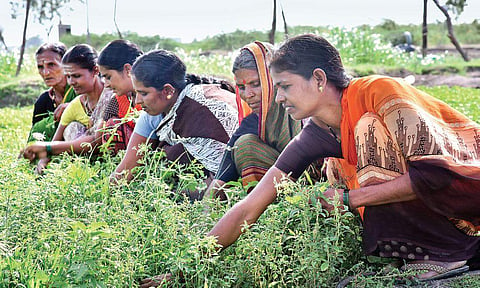

MYSURU: After undergoing a lot of hardships, women from rural villages here managed to venture into businesses by taking the micro-finance route and gradually became self-sustainable. But amid the present COVID-19 crisis, fear has gripped rural women who had become self-reliant about the sustainability of self-help groups (SHGs).
A plethora of problems are being faced by SHGs including lack of transport and marketing facilities to sell their produce, non-availability of loans, not being able to clear loans from banks and more.
There are over 12,000 SHGs in Mysuru and thousands of women members are dependent on them to earn their livelihoods. Added to this, over 80 NGOs which were working for the development of women by providing technical and managerial skills are also facing problems as they have not received any grants to undertake development courses for women and are also not able to visit any villages due to the restrictions imposed.
Sarala, a member of the 'Shakthi' self-help group, said that COVID-19 has changed their lives for the worse. "The present scenario has changed the fate of women who had become economically self-reliant. We are facing a lot of problems due to the lack of marketing facilities. We are also not able to meet and plan strategies and mobilise savings. It would take a few years for things to return to normal," she says.
Dr MP Varsha, managing trustee and CEO, CREDIT-I (Centre for Rural Education Development and Innovative Technologies of India), said that as the state continues to grapple with the COVID-19 pandemic, members of SHGs are worried about their future.
"Already, most SHGs are not functioning and the chain system has been disrupted. The repayments of loans will be another big challenge and we fear there would be a large number of defaulters. Most SHG members were selling their produce in urban areas but now they avoid visiting these areas due to fear of the virus and also strict restrictions by villagers,” Varsha added.
Nalini, a social worker at Mysuru Taluk, said, “SHGs had helped several women overcome hunger and poverty. Women had finally managed to come to the forefront but the impact of COVID-19 would take them back by 10 years. It will be very challenging to empower women again and there is a need to impart training for them to sell their products on online platforms.”